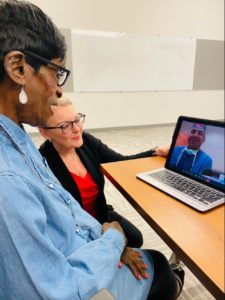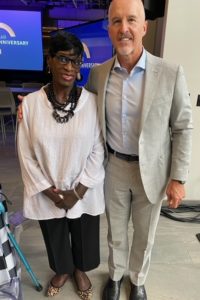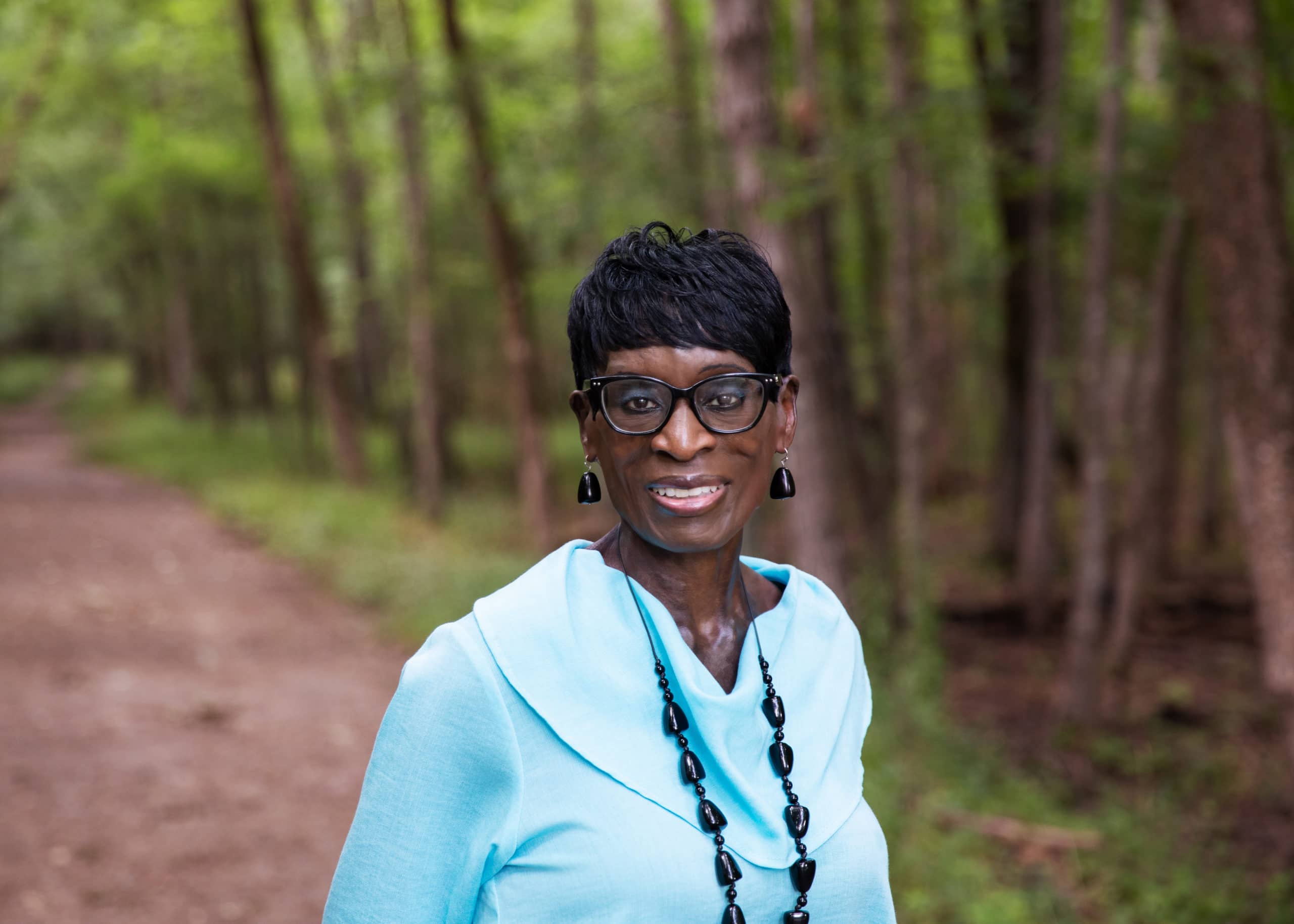Retired Educator Living Life to Fullest after Innovative Heart Surgery
| This has been a very busy year for Rosie Coleman of Sherwood.
Despite restrictions of an ongoing worldwide pandemic, the retired 40-year educator published a children’s book, provided one-on-one tutoring and flew to Boston to dine with the chief executive officer of a medical technology company for which she is now a star patient.

Coleman and Shannon Kjellsen, a patient advocacy manager at Abiomed in Boston, speak virtually with Dr. Bhama.
If it wasn’t for the foresight and quick-thinking actions of Jay K. Bhama, M.D., a cardiac surgeon at the University of Arkansas for Medical Sciences, she likely wouldn’t have lived to see 2021.
Coleman, 64, went to UAMS in November 2020 after experiencing shortness of breath, only to discover that she had congestive heart failure.
Because she also had atrial fibrillation, coronary artery disease and hypertension, she was recommended for coronary artery bypass grafting surgery. However, because of elevated liver enzymes she was sent home to rest prior to surgery to reduce the risk of bleeding.
She returned to UAMS for a high-risk quadruple-bypass surgery on Dec. 11, during which Bhama also repaired her tricuspid and mitral valves, and completed a procedure to treat her atrial fibrillation. While being weaned off the bypass, Coleman went into cardiogenic shock, in which the heart suddenly fails to pump enough blood to the body.

Coleman and her friend Marta Davis, who accompanied her to the patient summit in Boston.
Bhama, chief of the Division of Cardiac Surgery in the UAMS College of Medicine, regularly uses a device called the Impella 5.5 heart pump to temporarily help pump blood through the body while bypassing the left ventricle, which is responsible for pumping oxygenated blood throughout the body. While the device typically provides temporary assistance, Bhama tried a new technique that he had studied and allowed the device to remain in Coleman’s chest after surgery.
This permitted the left ventricle to rest for three days, after which Bhama removed the device bedside, without need for another surgery, sparing Coleman’s body from additional stress. She remained in the hospital for 21 days, and returned home with normal heart function.
Coleman, who retired three years earlier as executive director of elementary education for the North Little Rock School District, later learned how close she had come to dying, if not for the tiny motorized pump that, inserted into her aorta through a catheter, kept her blood flowing while her heart rested.
“Although cardiogenic shock is rare, it’s often fatal if not treated immediately,” Bhama said. “By being able to use this device immediately, keep it in place for an extended period and avoid another surgery to remove it, we avoided progressive severe damage to other organs and allowed her weak heart muscle to rest.”

Coleman meets with with Michael R. Minogue, the chairman, president and chief executive officer of Abiomed, in Boston.
After a period of recovery that included weeks of outpatient rehabilitation sessions, Coleman was thrilled to fly to Boston, the headquarters of Abiomed, a medical device provider that touts the Impella device as “the world’s smallest heart pump,” to share her story with others and tour the city.
Back in Arkansas, Coleman met with a UAMS dietician to learn how to put on weight in a healthy way. It was quite a switch for the woman who had lost 225 pounds over the previous three and a half years. She said doctors at UAMS told her after the surgery that at 125 pounds, she now weighed too little.
Beyond medical issues, the former educator whose career included 13 years as principal of Meadow Park Elementary School, also couldn’t wait to get back to her mission of ensuring adequate education opportunities for underprivileged children. She finished writing and editing her 27-page illustrated paperback book, “Give Me A Chance,” which was published by Christian Faith Publishing in Virginia, and spent part of her summer tutoring a fifth-grade student who was at the second-grade level academically.

Coleman’s book tells the story of two brothers, one starting Kindergarten and the other starting fourth grade.
The book tells the story of two brothers, one starting Kindergarten and the other starting fourth grade, whose potential is disregarded because they are poor and being raised by an irresponsible mother. Then they receive help from a kind teacher who understands the importance of children getting their basic needs met so they can learn – a message that Coleman has tried to deliver throughout her educational career.
Now, Coleman says, “I’m working on my second book,” through which she wants to impart Christian messages as encouragement for young people.
“I just have life now, so I’m able to do a lot of things I probably wouldn’t have been able to do before,” she says. “You’ve got to be faithful, and you’ve got to go forward.”
After her latest checkup in late September, her cardiologist, Srikanth Valluruapalli, M.D., an associate professor at UAMS, reported, “Ms. Coleman has recovered well from her surgery. With a combination of excellent medical therapy and cardiac rehabilitation, she is active and enjoying life to its fullest.”
Coleman says she is grateful to everyone at UAMS for the skills and resourcefulness that saved her life; the kindness that helped her stay positive during her hospitalization, when she was unable to have visitors; and the continuing care.
She calls Bhama “a gifted surgeon,” adding, “He’s very talented, but he also has heart. You can be the most gifted person in the world, but if you don’t know how to be kind, that means nothing.”
